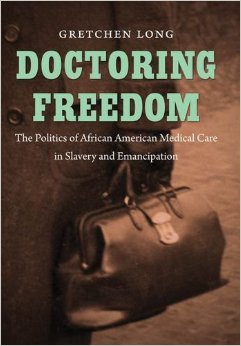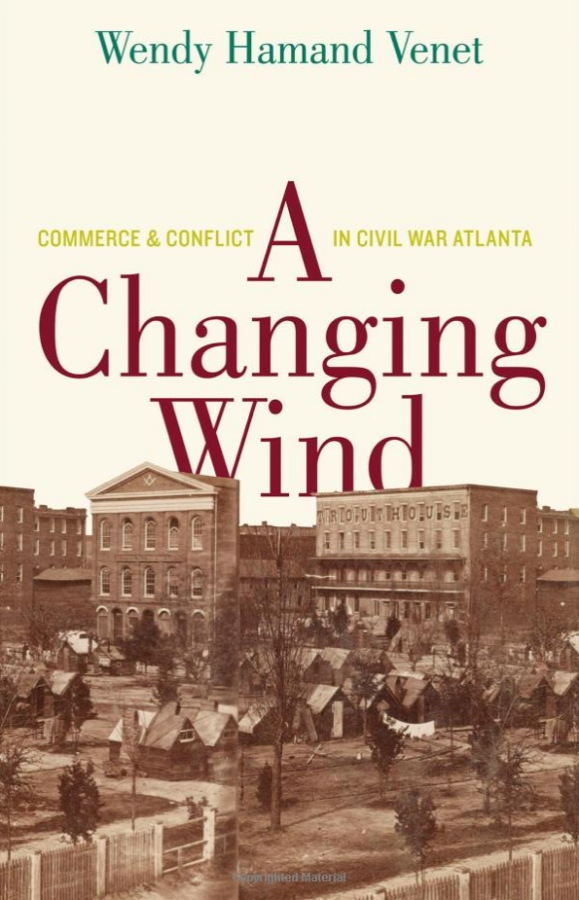Doctoring Freedom: The Politics of African American Medical Care in Slavery and Emancipation by Gretchen Long. University of North Carolina Press, 2012. Cloth, ISBN: 0807835838. $37.50.
 Gretchen Long’s Doctoring Freedom: The Politics of African American Medical Care in Slavery and Emancipation explores the medical world of African Americans from slavery through the Civil War and into their emancipated lives. But Doctoring Freedom is not a book so much about disease as it is about how slaves and then freedpeople navigated, negotiated, and exploited the politics of healing. Long denies that her book will satisfy a reader looking for “specific illnesses that African Americans fell victim to during slavery and freedom.” Nor, she writes, “is it an institutional history that focuses on the development and significance of black hospitals, medical associations, or nursing schools. Rather, it is African American history…most centrally concerned with medicine’s relationship to African American culture and politics” (8).
Gretchen Long’s Doctoring Freedom: The Politics of African American Medical Care in Slavery and Emancipation explores the medical world of African Americans from slavery through the Civil War and into their emancipated lives. But Doctoring Freedom is not a book so much about disease as it is about how slaves and then freedpeople navigated, negotiated, and exploited the politics of healing. Long denies that her book will satisfy a reader looking for “specific illnesses that African Americans fell victim to during slavery and freedom.” Nor, she writes, “is it an institutional history that focuses on the development and significance of black hospitals, medical associations, or nursing schools. Rather, it is African American history…most centrally concerned with medicine’s relationship to African American culture and politics” (8).
In this vein, Long develops two major claims. First, she argues that freedpeoples’ protests and activism were, in fact, participation in the democratic process. Tapping into a capacious notion of politics, she demonstrates African Americans’ agency under slavery and in the aftermath of emancipation. Of this claim, Long writes: “In making decisions about medicine, medical treatment, and medical education, African Americans, both enslaved and free, deployed the same skills they used in more traditionally political forums—balancing self-interest with the longer-term interest of their community, deciding who belonged to their community and who did not, and negotiating with different white actors for funds, treatment, and recognition from the U.S. government” (4-5).
Second, Long suggests that the same activism that created space for African Americans in the body politic simultaneously allowed African Americans to join the modernizing medical community of the late nineteenth century. As she explains, medical culture “had for decades been instrumental in denying them rights and personhood.” Yet now it was a space to establish prominence in intellectual, professional, and political arenas (5). In other words, blacks employed the oppressors’ tools in their struggle for liberation.
Readers of The Civil War Monitor will be especially interested in Doctoring Freedom because Long identifies the war as a pivotal moment in the transformation of medical culture for African-Americans. Black military service and battlefield wounds prompted nothing short of a revolution in meaning and self-understanding. “For soldiers and caregivers alike, the soldiers’ medical needs, and the care they felt they deserved, became a path to understanding their emancipation,” she writes (89).
Long contends that the events and efforts surrounding black soldiers’ needs for medical care during the war “solidified a platform on which to build a concept of African American citizenship,” and she elaborates on the meaning of wounds and the various ways soldiers went about getting care (81). Black men wore wounds as “proof of membership in the Union cause” and evidence of their commitment to the body politic; following the small-r republican theme of military service as an obligation of citizenship, the wounds deemed African American soldiers worthy members of the republic (84). Moreover, soldiers wrote letters to politicians, circulated petitions, and printed editorials to gain care. Associations and benevolent societies’ efforts on behalf of soldiers further ushered African Americans into the public sphere, and their successful operations challenged the stereotype that African Americans were dependent (110).
Long’s book expands and adds complexity to the literature on African Americans’ status as citizens in the nineteenth century. She does not delve deeply into the lives of freedpeoples not associated with soldiers or soldiers’ families, a gap which might have been filled for a more complete picture. Nevertheless, her nuanced study compels us to think in new ways about what it means to be a citizen.
Doctoring Freedom fits within a growing historiography on how African Americans exercised agency when the Civil War disrupted slaveholders’ power. Long’s history also appears as historians continue to wrestle with the contradictory consequences of emancipation. As historian Jim Downs explains in his important book Sick from Freedom, former slaves struggled although they were freed. Sickness, suffering, and a lack of shelter ensured that the effects of emancipation were not all praiseworthy. Like Downs, Long’s work is evidence of a growing sophistication in emancipation studies. The author brings what happened during and following the war into sharper relief, and she provides further evidence of what exactly freedom was to those who knew well what it was not.
Jonathan Lande is a Ph.D. student in the Department of History at Brown University.
